Topics on this page

Regular Dental Exams
It is important to continue regular exams and cleanings at your dentist's office during orthodontic treatment. Cleanings may need to be done more often than usual, especially when wearing braces.
Bonding
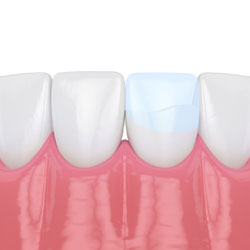 Bonding of teeth by your dentist may be necessary for various reasons to enhance your final orthodontic outcome. ↑ Back to top
Bonding of teeth by your dentist may be necessary for various reasons to enhance your final orthodontic outcome. ↑ Back to top
Bridges
 A bridge by your dentist may be used to replace missing teeth. Orthodontic "uprighting" may be benefical to improve the quality and longevity of a bridge that is planned.
A bridge by your dentist may be used to replace missing teeth. Orthodontic "uprighting" may be benefical to improve the quality and longevity of a bridge that is planned.
Crowns
 Crowns are a restorative procedures performed by your dentist used to improve your tooth’s shape or to strengthen it. ↑ Back to top
Crowns are a restorative procedures performed by your dentist used to improve your tooth’s shape or to strengthen it. ↑ Back to top
Extractions
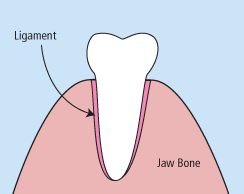 There are times when it is necessary to remove teeth for orthodontic purposes. The reasons why are situation specific and will be explained when uour treatment plan is presented.
There are times when it is necessary to remove teeth for orthodontic purposes. The reasons why are situation specific and will be explained when uour treatment plan is presented.
Fluoride
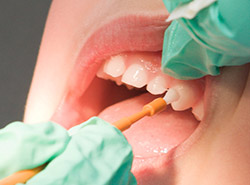 Fluoride is effective in preventing cavities and tooth decay. It is highly recommended to have periodic fluoride treatments at your dental office while undergoing orthodontic treatment, especially with braces.
Fluoride is effective in preventing cavities and tooth decay. It is highly recommended to have periodic fluoride treatments at your dental office while undergoing orthodontic treatment, especially with braces.
Implant Restoration
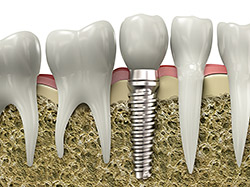 If you are missing teeth, and implant supported crown may be recommended by your dentist rather than bridge. One advantage is the teeth adajacen to the space do not have to be trimmed/cut down. Orthodontics can help prepare the implant site to improve the final result.
If you are missing teeth, and implant supported crown may be recommended by your dentist rather than bridge. One advantage is the teeth adajacen to the space do not have to be trimmed/cut down. Orthodontics can help prepare the implant site to improve the final result.
Mouthguards
 Whether you wear braces or not, protecting your smile while playing sports is essential. Mouthguards help protect your teeth and gums from injury. If you need a mouthguard for sports, Dr. Sean or Barry white can advise on the best type for you to avoid damage to your braces or hindering your orthodontic treatment.
Whether you wear braces or not, protecting your smile while playing sports is essential. Mouthguards help protect your teeth and gums from injury. If you need a mouthguard for sports, Dr. Sean or Barry white can advise on the best type for you to avoid damage to your braces or hindering your orthodontic treatment.
Nightguards
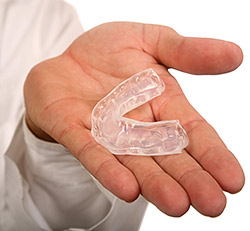 If you often wake up with jaw pain or headaches, or find yourself clenching or grinding your teeth, you may have a common condition called “bruxism.” Many people do not even know they grind their teeth, since it often occurs when one is sleeping. If not corrected, bruxism can lead to tooth wear, broken teeth, cracked teeth, or even tooth loss.
If you often wake up with jaw pain or headaches, or find yourself clenching or grinding your teeth, you may have a common condition called “bruxism.” Many people do not even know they grind their teeth, since it often occurs when one is sleeping. If not corrected, bruxism can lead to tooth wear, broken teeth, cracked teeth, or even tooth loss.
There is an easy, non-invasive treatment for bruxism. Nightguards are a way to prevent the wear and damage that teeth-grinding causes over time. They are best done after orthodontics is completed and may act as a retainer as well.
Sealants
A Sealant is a bonded plastic coating that seals the small fissures and grooves on the tops of back teeth. These fissures can be impossible to clean and decay may start within them. Sealants are a ideal way to prevent this type of cavity from forming.
Wisdom Teeth
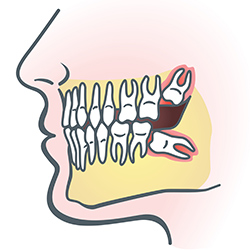 Wisdom teeth are third molars found in the very back of your mouth. Most people have room for first and second molars but not third molars. They usually appear in the late teens or early twenties and may become impacted due to lack of room. Evidence shows wisdom teeth do not contribute significantly to dental crowding however there are other reasons they may need to be removed. Dr. White can advise you on your specific orthodontic situation.
Wisdom teeth are third molars found in the very back of your mouth. Most people have room for first and second molars but not third molars. They usually appear in the late teens or early twenties and may become impacted due to lack of room. Evidence shows wisdom teeth do not contribute significantly to dental crowding however there are other reasons they may need to be removed. Dr. White can advise you on your specific orthodontic situation.

